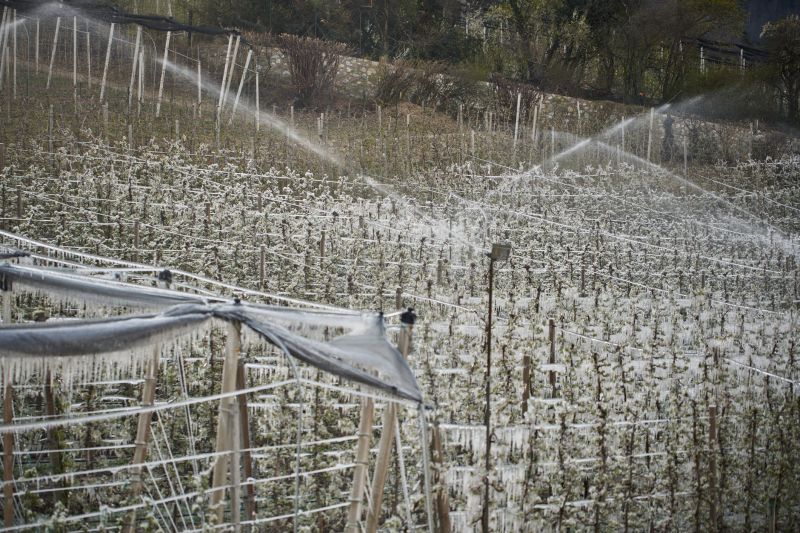Favorite Products For Easy Irrigation System Winterizations
Select user-approved tools and supplies designed for straightforward winterization of your irrigation infrastructure.
 Preparing an irrigation system for winter involves a careful process of winterization to prevent damage from freezing temperatures. The primary goal is to remove residual water from pipes, sprinklers, and hoses, which can expand when frozen and cause cracks or bursts. A variety of products are available to facilitate this process, each designed to target specific components of an irrigation system. From specialized blow-out kits to compressed air tools, the right equipment can make winterization safer and more effective.
Preparing an irrigation system for winter involves a careful process of winterization to prevent damage from freezing temperatures. The primary goal is to remove residual water from pipes, sprinklers, and hoses, which can expand when frozen and cause cracks or bursts. A variety of products are available to facilitate this process, each designed to target specific components of an irrigation system. From specialized blow-out kits to compressed air tools, the right equipment can make winterization safer and more effective.
Top Overall Option
Comprehensive Blow-Out Kit
A versatile blow-out kit designed to efficiently clear water from irrigation lines, featuring multiple nozzles, quick-connect fittings, and easy-to-use components suitable for various system sizes. It offers a reliable solution for winterizing sprinkler systems and hoses, helping to prevent freeze damage with minimal effort.
Types of Products For Irrigation Winterizations
Compressed Air Blow-Out Kits
Tools that use compressed air to force water out of sprinkler lines and hoses, often including multiple fittings and nozzles for compatibility.
Hose End Caps and Plugs
Protective caps and plugs designed to seal hoses and prevent water ingress during winter months.
Valve Covers and Insulation
Protective covers and insulation materials for valves and exposed piping to prevent freezing and damage.
Backflow Preventers
Devices installed to prevent water from siphoning back into the potable water supply, often drained or insulated for winter.
Drain Valves and Drain Fittings
Components that facilitate draining water from sprinkler lines and pipes to prevent freezing.
Sprinkler Head Covers
Protective covers that shield sprinkler heads from ice and debris during winter.
Air Compressor Attachments
Specialized fittings and hoses compatible with air compressors for efficient system blow-out.
Hose Reels and Storage Containers
Equipment for storing hoses safely during the off-season, preventing damage and prolonging lifespan.
Automatic Drain Valves
Valves that automatically drain water from pipes and sprinklers when the system is turned off.
Manual Drain Valves
Valves that require manual operation to drain residual water from irrigation lines.
Insulating Tape and Wraps
Materials used to insulate pipes and exposed components against freezing temperatures.
Winterization Spray
Protective sprays designed to coat and insulate vulnerable parts of the irrigation system.
Portable Air Compressors
Compact compressors suitable for small to medium irrigation systems, used to blow out water lines.
Water Removal Pumps
Devices that help remove standing water from pipes and equipment before winter sets in.
Irrigation System Flush Kits
Complete kits that facilitate flushing out debris and residual water from the system prior to winterization.
Popular Choices
Widely used for clearing irrigation lines efficiently, compatible with various system sizes.
Commonly used to seal hoses and prevent water from entering during winter.
Popular for protecting valves from freezing damage.
Frequently chosen to safeguard sprinkler heads from ice and debris.
Preferred for automatic drainage of water from pipes, reducing manual effort.
Reliable for manual draining of irrigation lines, especially in smaller systems.
Popular for insulating exposed pipes and preventing freezing.
Favored for their portability and ease of use with small to medium systems.
Commonly used for storing hoses safely during off-season months.
Helpful for removing excess water from system components before winter.
Popular for comprehensive flushing to prepare systems for winter.
Understanding the different types of products suitable for winterization can help users select the most appropriate tools for their system size and complexity. For example, simple hose end caps are useful for protecting hoses, while more advanced blow-out kits are capable of clearing entire sprinkler lines efficiently. It's important to consider the compatibility of these products with existing irrigation components and to follow manufacturer instructions carefully to ensure proper winterization.
Proper storage and maintenance are also crucial aspects of irrigation winterization. Using insulated covers for exposed valves and storing hoses indoors can extend the lifespan of system components. Regular inspection before winter sets in can identify potential issues, such as leaks or damaged parts, that might require attention. Investing in quality products designed specifically for winterization can help prevent costly repairs and ensure the system remains functional for the next season.
Overall, choosing the right products for irrigation winterization involves considering the complexity of the system, the local climate, and ease of use. While some homeowners may opt for basic tools, others with more extensive systems might prefer comprehensive kits that streamline the process. Proper winterization not only protects the irrigation infrastructure but also contributes to the longevity and efficiency of the system over time.
Key Buying Considerations
- Compatibility with existing irrigation components and system size.
- Ease of use and installation, especially for DIY users.
- Effectiveness of the product in removing residual water.
- Durability and quality of materials used in the product.
- Ease of storage and portability of equipment.
- Compatibility with compressed air or other tools you plan to use.
- Availability of replacement parts or fittings.
- Weather resistance and insulation properties for outdoor components.
- Ease of maintenance and cleaning of the products.
- Safety features, especially when using compressed air or pumps.
- Cost-effectiveness relative to the size and complexity of your system.
- Brand reputation and user reviews for reliability.
- Availability of comprehensive kits versus individual components.
- Instructions and support provided for proper winterization procedures.
- Environmental considerations, such as non-toxic materials or sprays.
